React Native is an awesome open-source mobile app development tool created by Facebook and the community. You can build Android and iOS apps using the framework.
Making an application using native languages such as Java, Objective-C, and C# will take a ton of time. And if you hire an expert in these languages, it will cost you a fortune.
So what can you do in this situation?
You may prefer to choose to React Native for building the next mobile app for your business.

As you can see from the chart below, global interest in React Native is increasing.
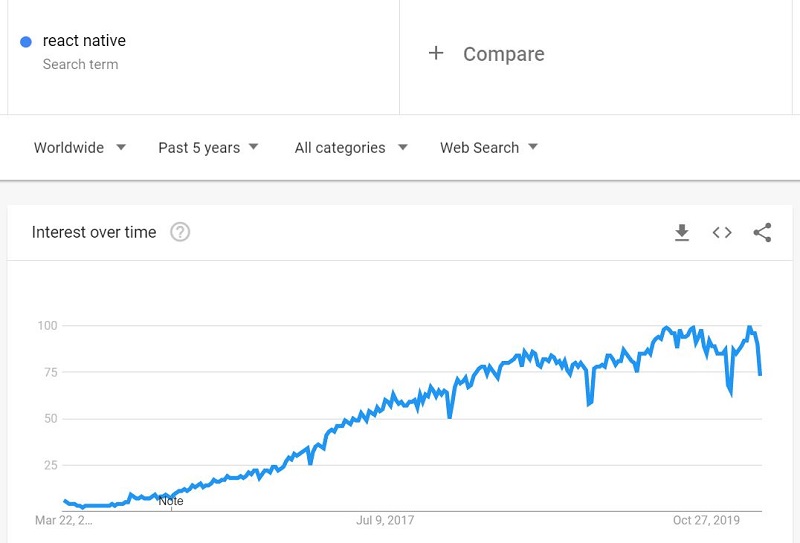
But why are more and more people getting interested in this framework over the past few years?
It’s simply because this is a powerful, cross-platform mobile app development tool that lets you build high-quality mobile apps very fast.
Let’s find out why to choose React Native for mobile app development.
Amazing Performance
-
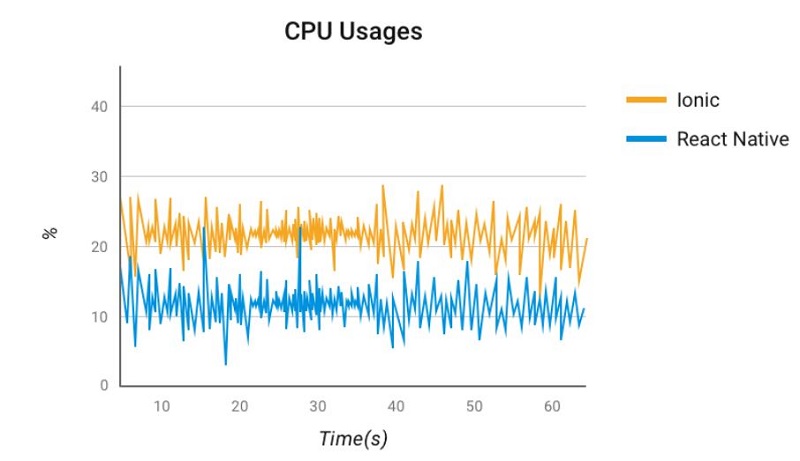
Source – simform.com
It may not be as fast as the truly native apps that are built with native languages such as Java, Objective-C, and C#. But, you will get near-native performance as it gives you native components like Image, View, and Text.
A mobile app based on React Native is not an HTML5, hybrid or a mobile web app. Rather, it’s a real mobile app.
You can take your React Native app performance to the next level by optimizing your application with native code. Yes, React Native lets you use native code, too. For maximum performance, you can build some features in your app using native code and some features with React Native.
Rich UI
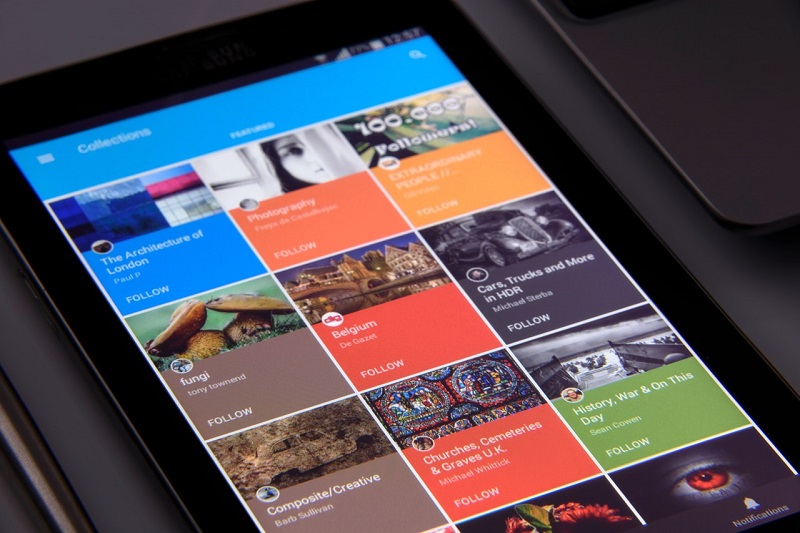
React Native lets you create unique, eye-catching UIs through pre-built declarative components, such as Picker, Button, Slider, Switch, and so on. You can also make your own components with TouchableNativeFeedback and TouchableOpacity. There are many iOS and Android-specific components available to make it work efficiently on Android and iOS mobiles.
Ex:
- iOS – ActionSheetIOS, AlertIOS, DatePickerIOS, ImagePickerIOS, ProgressViewIOS, PushNotificatoinIOS, SegmentedControlIOS, etc.
- Android – DatePickerAndroid, DrawerLayoutAndroid, PermissionsAndroid, ProgressBarAndroid, TimePickerAndroid, ToastAndroid, ToolbarAndroid, ViewPageAndroid, etc.
Fast App Development
React Native gives you components for text, image, keyboard input, scrollable lists, progress bar, animations, clipboard, linking, and so on. These components greatly speed up the app development process, and the Hot Reloading feature also saves you a lot of time as it lets you reload your app without recompiling the entire code.
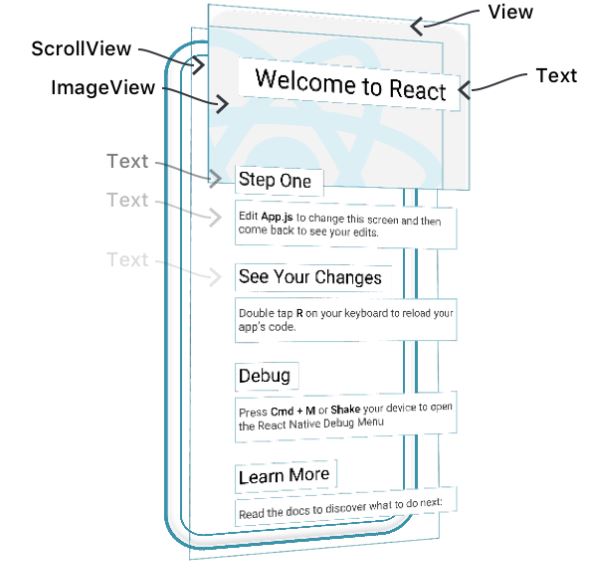
React Native libraries such as Redux (for handling your app’s state) and Awesome React Native (a list of components and demos) will also help you complete your mobile app development work faster.
Development tools like Nuclide for writing code, Yoga for building layouts, Sentry for error and crash monitoring, and React Developer Tools for debugging make the React Native development process a lot easier and faster. Other great React Native tools include VS Code, Ignite, Expo, and Bugsnag.
Cross-platform Development
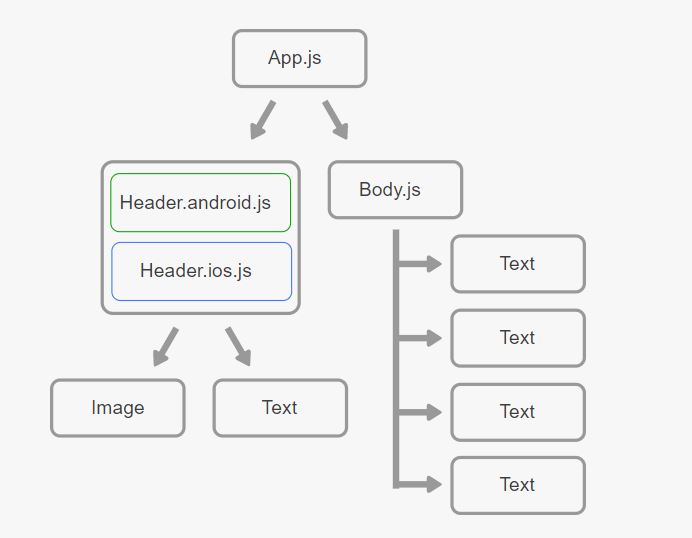
Code once, use it everywhere. Save time and money by building cross-platform apps. But keep in mind that you still need to make some platform-specific adjustments.
Strong Community Support

More than 2,000 contributors with above 85,000 stars on GitHub.
Companies such as Callstack, Software Mansion, Microsoft, and Infinite Red have contributed to this framework. You will find lots of React Native components and libraries created by the community of developers on sites like JS.coach and Native Directory.
Get help on StackOverflow, Reddit or Codementor. You’ll always find someone to help you. You can also get help from the Reactiflux Discord community, the React Native Facebook Group, and the React Native Spectrum community.
Easy to Learn
See the coding style from the Hello World program below. You can easily understand the following code example if you know the basics of JavaScript and React.
import React, { Component } from 'react';
import { Text, View } from 'react-native';
export default class HelloWorldApp extends Component {
render() {
return (
Hello, world!
);
}
}The official docs are beginner-friendly and have code examples. Besides the official documentation, you may also try the following to get hands-on.
- The Complete React Native Hooks Course on Udemy
- Multiplatform Mobile App Development on Coursera
- React Native Tutorial for Beginners on YouTube
- Redux video tutorial
- Curated list of example apps
You’ll also get useful React Native related information on places like Medium, DevTo, React Native blog, and React Native Twitter page.
Credibility
Popular mobile apps such as Facebook, F8, Facebook Ads Manager, Instagram, Skype, Bloomberg, Discord, Tesla, Airbnb, Chop, Artsy, Walmart, and Vogue have used this framework.
That speaks a lot!
Cons
Everything has pros and cons. Isn’t it?
I talked about many positive aspects of React Native. But it has a few issues such as large app size, memory leakage in Android apps due to unnecessary processes that run in the background, slow app launch because of some dependencies, and so on. But you can fix and manage these issues to some extent.
You can decrease the app size by reducing the number of libraries and components used in the app. You may also compress images and optimize app resources to lower the size of your application.

You can solve the memory leakage problem in an Android app by using scrolling lists like SectionList, FlatList, and VirtualList. Avoid using ListView to get rid of memory leaks. To fix the slow app launch issue, you have to decrease the number of dependencies in your app and you need to use the components that perform very well.
Final thoughts
If you closely take a look at the benefits and the problems of React Native, you can understand that the pros of this framework heavily outweigh the cons. The issues that you’ll spot are not big. The cons of this framework are negligible, as the benefits you’ll get are super exciting and hugely amazing.
Easy communication between React Native and native, effortless publishing to Google Play Store, ability to build for TV devices, and integration with existing apps are some of the other interesting features and benefits that come with this modern mobile app development tool.




